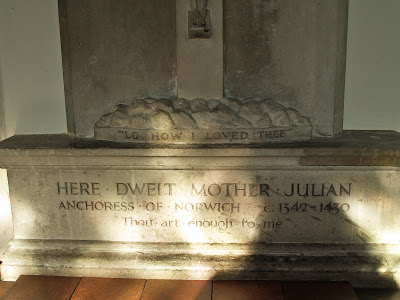“All shall be well, and all shall be well and all manner of thing shall be well.”
“God loved us before he made us; and his love has never diminished and never shall.”
“God, of thy goodness, give me Thyself;
for Thou art enough for me,
and I can ask for nothing less
that can be full honor to Thee.
And if I ask anything that is less,
ever Shall I be in want,
for only in Thee have I all.”
“Truth sees God, and wisdom contemplates God, and from these two comes a third, a holy and wonderful delight in God, who is love.”
“What, do you wish to know your Lord’s meaning in this thing?
Know it well, love was his meaning.
Who reveals it to you? Love.
What did he reveal to you? Love.
Why does he reveal it to you? For love.
So I was taught that love is our Lord’s meaning.
And I saw very certainly in this and in everything that before God made us he loved us, which love was never abated and never will be.”
Is there someone in Christian history that resonates with your spiritual walk?




I really enjoyed reading about her again. It was so very special sitting in her cell all by myself. You could feel her present. I really do believe our God touches us closely and holds us tighter when we are ill. Thanks for stopping by Mia
You are so right and perfect for this weekend, to appreciate those Christian men and women in our history. what courage they had and such a model for each of us!
Dear Jean
What a lady she was! I eecall the time when I was also bery, very ill and I also didn’t think I was going to live. Our Pappa revealed Himself to me in incredible real intimate ways that I wil never forget.
Blessings
Mia
“Truth sees God, and wisdom contemplates God, and from these two comes a third, a holy
and wonderful delight in God, who is love.”
Such a lovely quote that has such authenticity resonating through it. My Christian history hero’s are the US founding fathers. Men and women of integrity, mission, and faith put into action. They lived lives of extreme bravery driven by what they felt led by God to do in an effort to bless future generations. I’m so grateful for the saints that came before us.
ah yes, delightful discovery of the divine. That is a great quote, Nancy!
Thank you, Jean, for introducing us to Julian of Norwich. I was not familiar with her story, although I do have one of her quotes in my collection: “He willeth that we be occupied in knowing and loving till the time that we shall be fulfilled in heaven.” Her comment makes me think: Because God is infinite, there will always be more to know and love. Our occupation of delightful discovery will never end. Hallelujah!